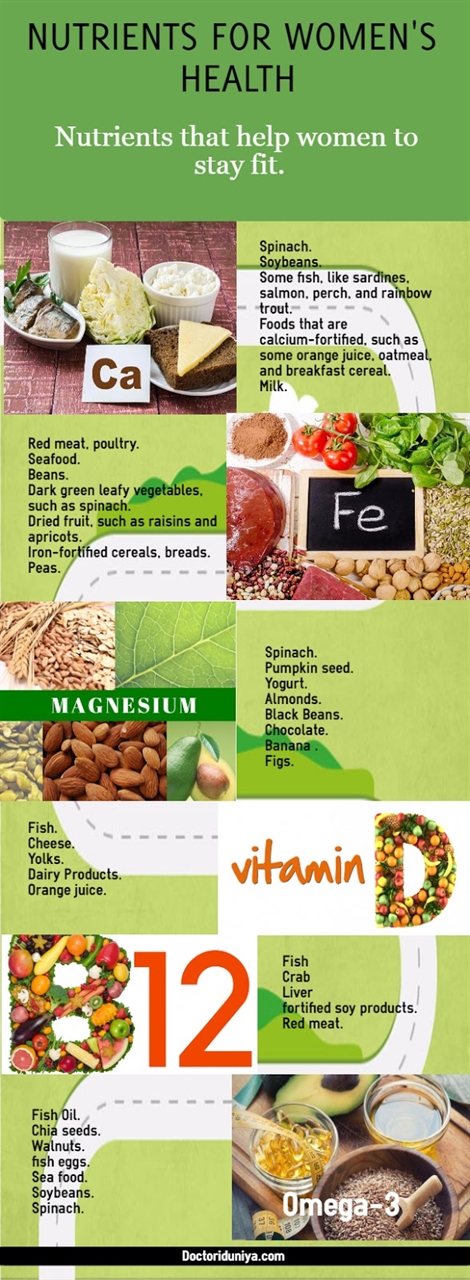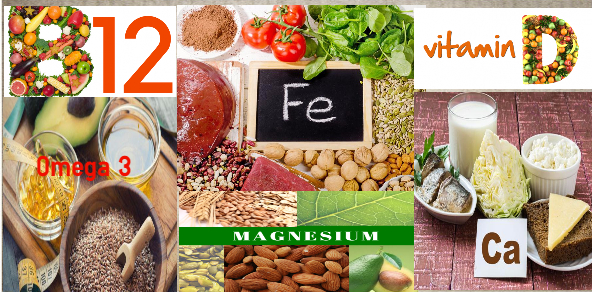Must Take Nutrients for Women
Women are more susceptible to diseases like osteoporosis, cardiovascular diseases, diabetes, cancer etc due to their complicated body functions. Apart from the complex body function, they also have to manage stressful life while making a balance between work and personal life. Women require nutrition at every stage of the life. As they start getting age, they start getting prone to diseases like heart problem, insulin resistance, bone problems and more of hormonal imbalance disorders. It is advisable for women to add more balanced food in their day to day life. Nutrients deficiency can be the reasons of early aging, anemia, extreme fatigue, osteoporosis, stroke, and hormonal disorder. Keeping this in mind, here is a list of some of the most important nutrients mandatory for women on the daily basis that can greatly contribute to a woman’s good health and prosperity.
1. Calcium- Calcium is the vital nutrients amongst other nutrients and plays an important role to keep the body fit. It is essential for proper functioning of nerves, cells, muscle, and bone. If there is a deficiency of calcium in the blood, then the body will absorb calcium from bones, thereby weakening bones. Due to the lack of calcium, women are five times more susceptible than men to develop osteoporosis, which is associated with a higher risk of fractures. The minimum daily calcium requirement for women 50 and younger is 1,000 milligrams a day and for women, over 50 it's 1,200 milligrams.
Source- Milk and milk products, green leafy vegetables, almonds, and seeds.
2. Iron- Iron is a mineral which is necessary to ensure healthy blood and normal growth and development. Iron plays an important role in carrying oxygen to your muscles and brain. Women aged between 12 and 50 need more iron than men. The recommended daily allowance (RDA) is 14mg compared to 10mg per day for men. Anemia is particularly common in women, which is caused by the deficiency of iron. In fact, it's the most prevalent deficiency in the world, affecting about 1 billion people. It causes many unpleasant symptoms of iron-deficiency anemia, which can include: extreme fatigue, weakness, pale skin, shortness of breath, headache, dizziness or light-headedness, cold hands and feet, irritability.
Source- Red meat, tomatoes, strawberries, citrus fruits, leafy greens, beans, fortified cereals, egg yolks, tofu, and dried fruits.
3- Magnesium- Magnesium helps from boosting mood to building stronger bones, this essential mineral also help to prevent heart disease and improve cardiovascular function and tissue health.Magnesium deficiency can be linked to heart disease and hypertension, in addition to respiratory disorders, gastrointestinal problems, and depression. Women desperately need magnesium, says women's health expert as it prevents a migraine, osteoporosis, type 2 diabetes, stroke etc.
Source- Spinach, banana, figs, almonds, black beans, yogurt, chocolates etc.

4. Vitamin D- Vitamin D also called as the sunshine vitamin because it is produced by the sun in the skin. Vitamin D is produced by the body in response to the skin being exposed to sunlight. It is also found in some fish, fish liver oils, and egg yolks and in fortified dairy and grain products. Vitamin D is extremely important for strong bones because it helps the body use calcium from the diet. vitamin D deficiency can cause rickets, a disease in which the bone tissue doesn't properly mineralize, leading to soft bones and skeletal deformities.
Source- Egg, Dairy products, Orange juice, Fish etc.
5- Vitamin B12- Vitamin B12 is vital for your nervous system and for creating DNA and RNA, the building blocks of every cell in your body. You need B12 to maintain everything from your mood to your digestion. Yet many people have no idea about the signs and symptoms of low B12. The only way to get vitamin B12 in your diet is by eating meat. If you avoid animal products, then a B12 deficiency is guaranteed without supplementing.
Source- Red meat, milk, cheese, yogurt, fortified soy etc.
6- Folic acid or folate or vitamin B 9- another form of which is known as folate, is one of the B vitamins. The recommended daily intake level of folate is 400 micrograms from foods or dietary supplements. Folic acid is used to treat anemia caused by folic acid deficiency. It is also used as a supplement by women during pregnancy to prevent neural tube defects in the baby.
Source- Dried beans, peas, nut, dark green vegetables, citrus fruits, and juice.
7- Omega 3 fatty acid- There are some fats, namely monounsaturated fats, and polyunsaturated fats, which are good for health and helps reduce the danger of heart disease.Generally, omega-3, a type of polyunsaturated fat, is key to optimal health.As the human body cannot produce it on its own, it is essential to get omega-3 from your daily diet.It helps to prevent heart diseases and arthritis.
Source- Eggs, dairy products, nuts, fish oil, white fish etc.

Comments
Post a Comment